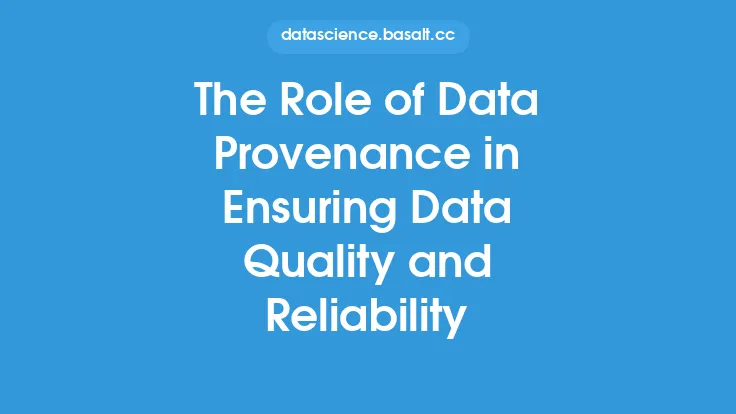Data quality and integrity are crucial aspects of any organization's data management strategy. The accuracy, completeness, and consistency of data have a direct impact on the decision-making process, business operations, and ultimately, the success of the organization. One of the key factors that contribute to ensuring data quality and integrity is data storage. In this article, we will delve into the role of data storage in maintaining data quality and integrity, and explore the various techniques and technologies that can be employed to achieve this goal.
Introduction to Data Quality and Integrity
Data quality refers to the accuracy, completeness, and consistency of data, while data integrity refers to the assurance that data is not modified, deleted, or corrupted during storage or transmission. Ensuring data quality and integrity is essential to maintain the trust and confidence of stakeholders, including customers, employees, and partners. Poor data quality and integrity can lead to incorrect decisions, financial losses, and damage to reputation. Therefore, it is essential to implement robust data storage solutions that can ensure the quality and integrity of data.
Data Storage and Data Quality
Data storage plays a critical role in maintaining data quality. The storage infrastructure should be designed to ensure that data is stored in a secure, reliable, and scalable manner. This includes implementing data validation and verification processes to ensure that data is accurate and complete. Data storage solutions should also be able to handle large volumes of data, provide high-performance data access, and support data analytics and reporting. Furthermore, data storage solutions should be able to integrate with other data management systems, such as data governance, data quality, and data security systems.
Data Integrity and Storage
Data integrity is ensured by implementing controls and mechanisms that prevent data from being modified, deleted, or corrupted during storage or transmission. This includes implementing access controls, such as authentication and authorization, to ensure that only authorized personnel can access and modify data. Data storage solutions should also provide data encryption, backup, and recovery mechanisms to prevent data loss and corruption. Additionally, data storage solutions should be able to detect and prevent data breaches, and provide audit trails to track data access and modifications.
Techniques for Ensuring Data Quality and Integrity
Several techniques can be employed to ensure data quality and integrity, including data validation, data verification, data normalization, and data standardization. Data validation involves checking data for accuracy and completeness, while data verification involves checking data against a set of predefined rules and constraints. Data normalization involves transforming data into a standard format, while data standardization involves establishing a common set of data definitions and formats. These techniques can be implemented using various data storage solutions, including relational databases, NoSQL databases, and data warehouses.
Technologies for Ensuring Data Quality and Integrity
Several technologies can be employed to ensure data quality and integrity, including data storage systems, data governance systems, and data security systems. Data storage systems, such as relational databases and NoSQL databases, provide a secure and reliable storage infrastructure for data. Data governance systems, such as data quality and data security systems, provide a framework for managing data quality and integrity. Data security systems, such as encryption and access control systems, provide an additional layer of protection for data. Additionally, technologies such as data masking, data encryption, and data tokenization can be used to protect sensitive data.
Best Practices for Ensuring Data Quality and Integrity
Several best practices can be employed to ensure data quality and integrity, including establishing a data governance framework, implementing data quality and data security policies, and providing training and awareness programs for employees. Establishing a data governance framework involves defining data management roles and responsibilities, establishing data quality and data security standards, and implementing data management processes and procedures. Implementing data quality and data security policies involves establishing rules and guidelines for data management, and providing a framework for managing data quality and integrity. Providing training and awareness programs for employees involves educating employees on data management best practices, and providing them with the skills and knowledge needed to manage data effectively.
Conclusion
In conclusion, data storage plays a critical role in ensuring data quality and integrity. By implementing robust data storage solutions, techniques, and technologies, organizations can ensure that their data is accurate, complete, and consistent. Additionally, by establishing a data governance framework, implementing data quality and data security policies, and providing training and awareness programs for employees, organizations can maintain the trust and confidence of stakeholders, and achieve their business objectives. As data continues to play an increasingly important role in business decision-making, the importance of ensuring data quality and integrity will only continue to grow, making it essential for organizations to prioritize data storage and data management.





